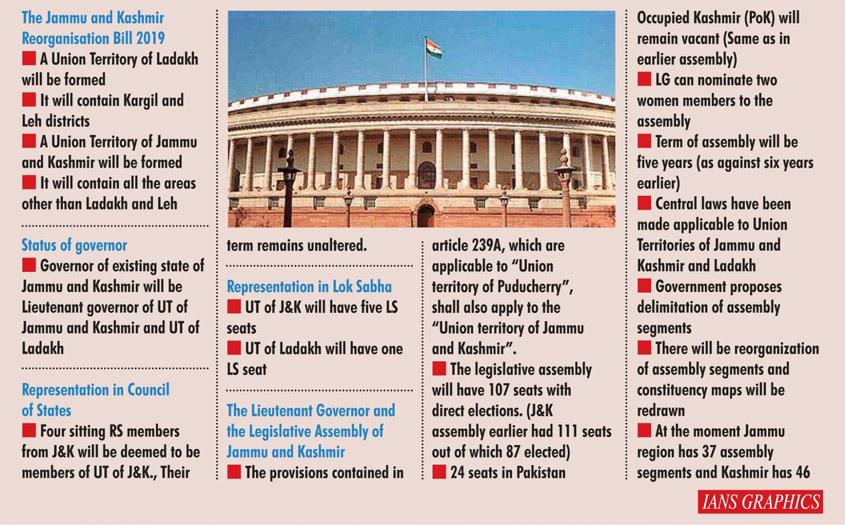The Narendra Modi government on Monday decided to revoke the 'special status' to Jammu and Kashmir. Article 370 of the Indian Constitution gives special status to India's border state.
The Rajya Sabha passed the Jammu and Kashmir Reorganisation Bill 2019 and adopted the resolution to scrap the Constitution's Article 370 paving way for bifurcation of the state into two Union territories and allowing people from other states to buy land there.
Union Home Minister Amit Shah introduced the Bill to abrogate the constitutional provision in the Rajya Sabha.
The Ministry of Law and Justice released an unsigned Presidential order – with details of the changes - immediately after Shah presented the Bill in Rajya Sabha.
Opposition members, including Congress, PDP and National Conference, tried to interrupt Shah throughout his speech. Two members of the People's Democratic Party (PDP) were physically removed from the Rajya Sabha after they tore copies of the Indian Constitution.
However, the BJP-led ruling alliance received support of many non-NDA parties, helping these measures sailing through the upper house of Parliament without much effort.
Opposition Leader Ghulam Nabi Azad of the Congress accused Narendra Modi government of murdering Indian Constitution. “It was the historic Article that linked Jammu and Kashmir to India,” he said.
Shah retorted saying that it was wrong to say that Article 370 of the Constitution brought Jammu and Kashmir to India. “Maharaja Hari Singh signed on the Instrument of Accession on October 27, 1947, while Article 370 came into existence in 1949,” he said.
J&K leaders arrested
The chiefs of the two major regional parties, National Conference's Omar Abdullah and PDP's Mehbooba Mufti, as well as People's Conference's leader Sajjad Lone were arrested in Srinagar on Monday evening, officials said.
Article 370 allows Jammu and Kashmir to have its own constitution, a separate flag and independence over all matters except foreign affairs, defence and communications.
Abrogation of Article 370 was one of the major poll promises of the BJP in the 2019 Lok Sabha election.
The decision to revoke the Article 370 is likely to trigger violence in the already trouble-torn Jammu and Kashmir. The government has boosted security measures across the State to prevent violence.

Political leaders in the State have condemned the government decision. Former State Chief Minister Mehbooba Mufti tweeted 'it was the darkest day in Indian democracy'.
Statehood will be restored: Amit Shah

On Monday, Shah tabled two other bills proposing to remove statehood of Jammu and Kashmir and its bifurcation.
The bill proposes to divide the State into two Union Territories - Ladak and Jammu and Kashmir. Jammu and Kashmir will have its own legislature, while Ladakh will be without assembly.
Rajya Sabha approved the bill for bifurcation of Jammu and Kashmir with 125 votes in favour as compared to 61 against it.
Both the bills will now come up in the Lok Sabha on Tuesday.
Allaying opposition fears of all hell breaking loose after the move, Shah replied, "nothing will happen" and the region won't be allowed to turn into another battle-torn Kosovo.
"It was heaven on earth and will remain so," he said replying to the debate on the resolution and the bill which were taken up together.

He said full statehood will be restored to Jammu and Kashmir at an "appropriate time" and after "normalcy" returns.
Security tightened

At least 8,000 paramilitary troops have been airlifted from different parts of the country and dispatched to the valley after Shah's announcement. They were airlifted from the states of Uttar Pradesh, Odisha and Assam. Several companies of various Central Armed Police Forces, including RAF, CRPF, ITBP and BSF had already been deployed in different districts of Jammu region over the past couple of days to beef up security there amid the lurking threat of terror attack.
















